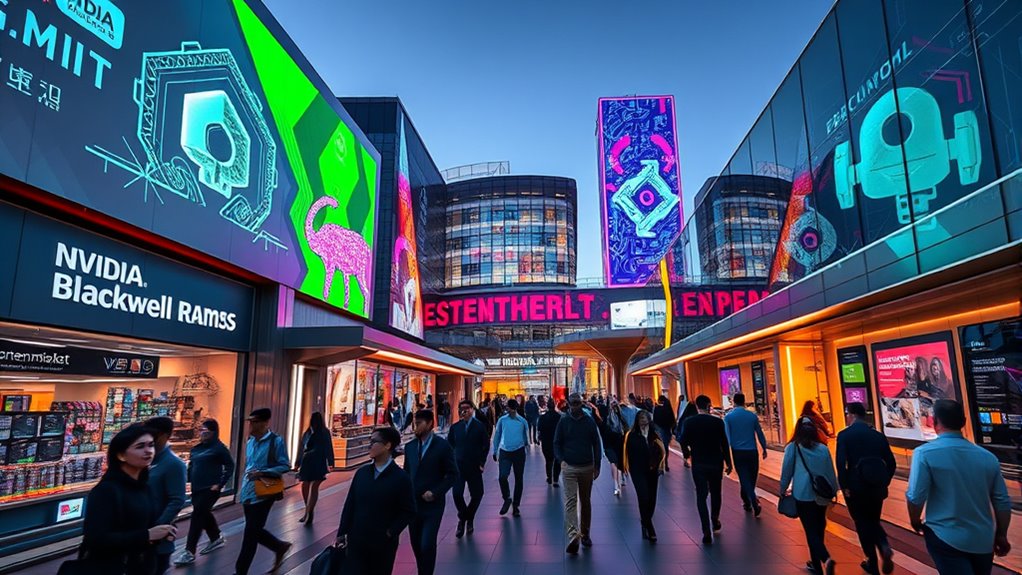In 2025, NVIDIA’s Blackwell architecture is set to revolutionize AI and high-performance computing, quickly gaining traction across cloud, healthcare, autonomous vehicles, and research sectors. You’ll see increased adoption of specialized chips focused on performance, efficiency, and scalability, shaping new industry standards. This rollout will prompt competitors to innovate and evolve their own offerings, ensuring the market’s momentum continues. Keep exploring to uncover how these changes will impact your technology landscape.
Key Takeaways
- NVIDIA Blackwell is scheduled for release in 2025, promising significant advancements in AI and high-performance computing.
- The rollout is expected to accelerate adoption across industries like cloud computing, healthcare, autonomous vehicles, and research.
- Blackwell will set new performance and efficiency benchmarks, prompting competitors to innovate in AI chip design.
- The ecosystem will evolve with new software frameworks, tools, and cloud services optimized for Blackwell’s capabilities.
- The market will see increased demand for powerful, purpose-built AI hardware, reinforcing NVIDIA’s industry leadership.

As 2025 approaches, NVIDIA is set to accelerate its rollout of the Blackwell architecture, signaling a major step forward in AI and high-performance computing. This shift is poised to reshape the landscape of AI chip advancements, pushing the boundaries of speed, efficiency, and scalability. You’ll notice that Blackwell’s introduction is not just an incremental upgrade; it’s a substantial leap designed to meet the growing demands of next-generation AI applications. As these chips become available, they’ll enable faster training of large language models, more sophisticated data analysis, and real-time AI processing that was previously out of reach. The development signifies NVIDIA’s commitment to pushing technological boundaries and staying ahead in the competitive AI hardware arena.
Market adoption trends are clearly favoring this move toward advanced AI chips like Blackwell. You’ll see industries such as cloud computing, autonomous vehicles, healthcare, and scientific research enthusiastically adopting these new architectures. Companies are looking for ways to harness the power of AI to gain competitive advantages, and Blackwell’s capabilities align perfectly with their needs. As more organizations integrate these chips into their infrastructure, the demand for high-performance AI hardware is expected to surge, accelerating adoption across multiple sectors. This trend highlights a broader industry shift toward specialized, purpose-built chips that optimize AI workloads and deliver superior performance per watt.
The rollout of Blackwell will likely influence the entire chip ecosystem, prompting other manufacturers to innovate and adapt, further fueling market adoption trends. As you follow the industry, you’ll observe that AI chip advancements aren’t just about raw power—they’re about efficiency, integration, and the ability to handle complex AI models at scale. Blackwell’s architecture is designed to excel in these areas, setting new standards for what AI hardware can achieve.
In addition, the ecosystem surrounding AI hardware—including software frameworks, development tools, and cloud services—will evolve to support Blackwell’s capabilities. This integration will make it easier for developers to deploy AI solutions at scale, further accelerating market adoption. As NVIDIA leads this charge, you can expect to see a ripple effect across the tech industry, with competitors racing to catch up and companies eager to leverage these advancements. Overall, the Blackwell ramp in 2025 marks a pivotal moment, one that’s poised to profoundly influence AI chip advancements and speed up the widespread adoption of powerful, efficient AI hardware worldwide.
Furthermore, the integration of AI-specific hardware like Blackwell is expected to drive innovations in AI workloads, enabling more complex and efficient AI applications across various sectors.
Frequently Asked Questions
How Will Blackwell Impact Nvidia’s Market Share?
Blackwell will likely boost your market share by driving AI breakthroughs that set new industry standards. As supply chain improvements make Blackwell GPUs more accessible, you’ll see increased adoption across sectors. This advanced technology positions you ahead of competitors, enabling you to capitalize on growing AI demand. Overall, Blackwell’s ramp-up strengthens your market presence and helps you maintain a leading edge in the evolving AI and tech landscape.
What Are Blackwell’s Key Technological Innovations?
Imagine a supercomputer on steroids—that’s what Blackwell’s innovations bring to your tech world. It turbocharges AI advancements with unprecedented processing power and precision. Plus, it sets a new standard for energy efficiency, consuming far less power while delivering lightning-fast performance. These technological breakthroughs make Blackwell a game-changer, transforming how you experience AI and cutting-edge computing, all while saving energy and boosting productivity.
Will Blackwell Influence Global GPU Pricing Strategies?
Yes, Blackwell will influence global GPU pricing strategies by affecting market elasticity. As its advanced technology boosts performance, manufacturers may adopt new pricing models to capitalize on demand. You’ll see more dynamic pricing, with companies adjusting strategies based on Blackwell’s competitive edge. This shift encourages innovation and could lead to more flexible, value-based pricing, ultimately shaping how GPUs are priced worldwide and how consumers respond to market changes.
How Does Blackwell Compare to Competitors’ Upcoming Chips?
Blackwell blows its competitors out of the water, offering mind-blowing AI integration and unmatched power efficiency that’s almost revolutionary. You’ll see it leap ahead in performance, making upcoming chips look like relics from the past. Its cutting-edge tech transforms the GPU landscape, setting new standards. If you want the best, Blackwell’s your game-changer, outpacing rivals with smarter AI features and lower power consumption that’ll leave everyone else in the dust.
What Are Blackwell’s Expected Applications Beyond Gaming?
You’ll find Blackwell excels beyond gaming, especially in AI acceleration and data center applications. Its powerful architecture boosts machine learning, deep learning, and large-scale data processing, making it ideal for enterprise use. As AI workloads grow, Blackwell’s high performance and efficiency help data centers handle complex computations faster. This broad application range positions Blackwell as a versatile chip, supporting everything from research to real-time AI services.
Conclusion
By 2025, NVIDIA’s Blackwell chips are expected to boost market share notably, with analysts predicting a 20% increase in GPU sales. You’ll want to keep an eye on this shift, as it could reshape the AI and data center landscapes. This rapid growth highlights NVIDIA’s innovation prowess and the growing demand for advanced processing power. Stay tuned — these developments could redefine your tech experience sooner than you think.










